FAQs
Can’t find an answer to a question? Then ask us a question and we will get back to you.
The OII’s research covers a vast range of topics and disciplines: law, economics, politics, digital humanities, etc etc. How do I know if I will fit into the mix?
The most fundamental requirement is that our SDP students must be writing a thesis or dissertation about some aspect of life with the Internet. Beyond that, it’s the place to be if you have an open-minded approach to how best to study the Internet. Our typical cohort includes students from a wide variety of disciplinary and methodological traditions, and what they all share is a genuine intellectual curiosity and a willingness to consider these different perspectives.
How much am I expected to know (or care) about other disciplines? What is the benefit of (for example) a law student, or economist engaging with people and ideas from outside their own discipline?
The simple answer is that you’re not expected to know about other disciplines, but you are expected to be interested in their possible contribution to your research field. One of the perks of running SDP is seeing all the water-cooler conversations striking up outside the formal seminars. So, for example, we’ve previously taken students focused on online privacy, some studying it from a sociological perspective, others from a regulatory one. Each may have knowledge of a common core of literature, but can still learn from the other’s expertise. Or in another case, students may not share a common disciplinary or even topic approach but could have similar interests in applying a particular method. In each case, there has to be a basic willingness to step back from your own work and see how others might understand it.
Do you accept candidates who study the Internet from outside the social sciences (eg the sciences and humanities)?
Yes, we certainly do, but with the proviso that most of our teaching will draw on social science theories and methods.
Do I have to study ‘the Internet’, or could my thesis research involve other ICTs?
We interpret the Internet in a very broad way, as a ‘network of networks’ that incorporates the use of many ICTs. We do have faculty who have focused specifically on the use of particular technologies e.g. mobile phones, or grid computing, but in each case, the interest stems from the fact that they are ‘wired’.
Should I have a clear idea / plan of what I want to get out of the programme?
Yes, this is really vital. First of all, the programme is going to cost you or your sponsor quite a bit of money and you have to be sure it’s worthwhile. But more importantly it will help to frame your application and your participation. For example, everyone who attends will benefit from the peer network established, but only those who have a genuine motivation to learn and a sense of their work’s weaknesses will be able to use the two weeks to really make progress on their thesis.
When is the ideal point in my doctoral studies to apply to the programme?
Applicants should be at an advanced stage of their doctorate and have started writing their thesis.
I haven’t decided on a thesis title yet: is that a problem?
We will give priority to those who are more advanced in their doctoral study. If you don’t have a final title yet, at least give us a provisional one.
If my application is not accepted, can I still apply for subsequent year(s)?
Absolutely! We always have more good applicants than we can accept, and sometimes an application is stronger when the applicant’s work becomes more advanced.


